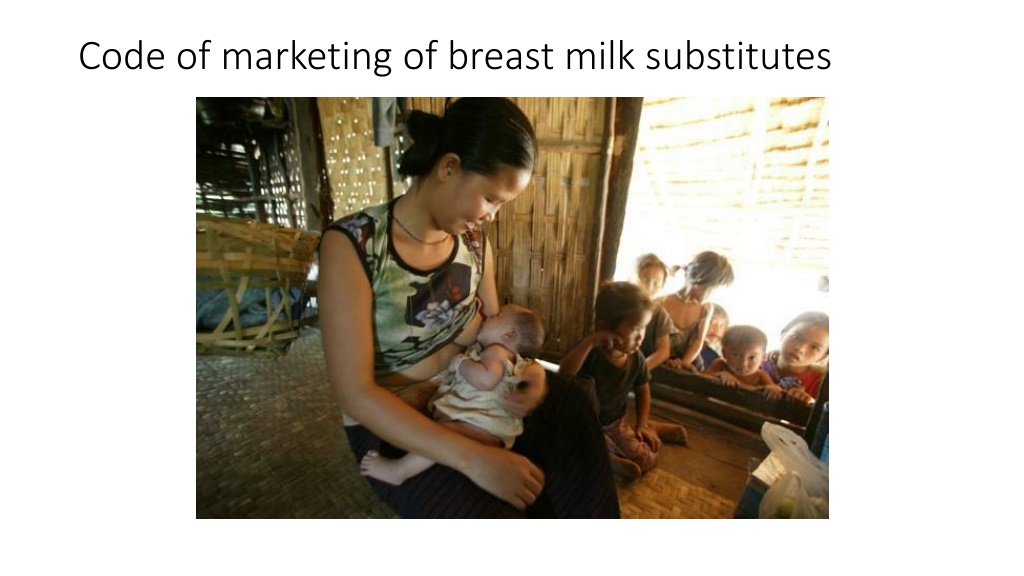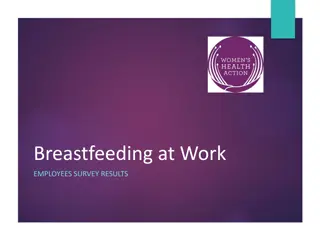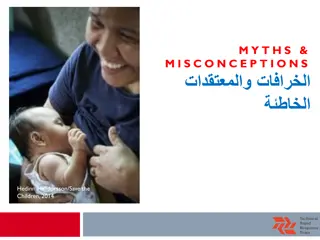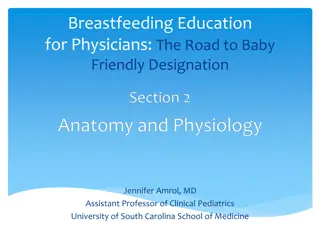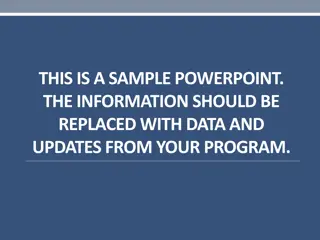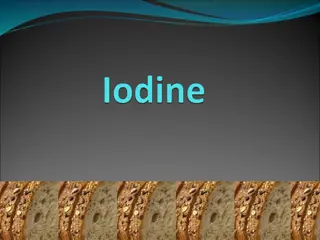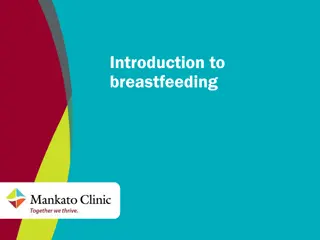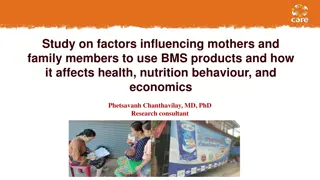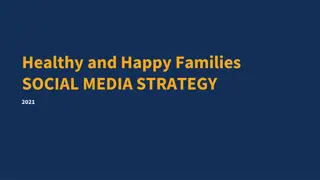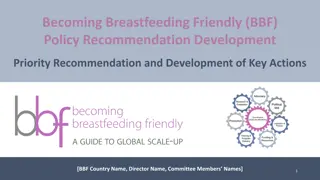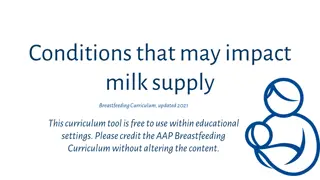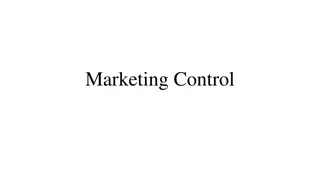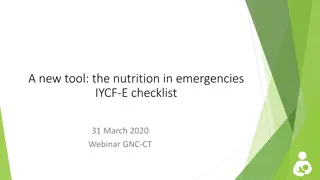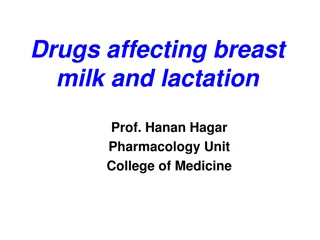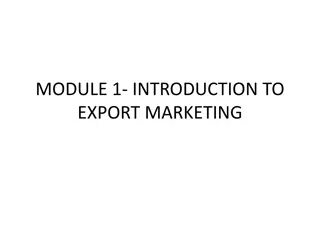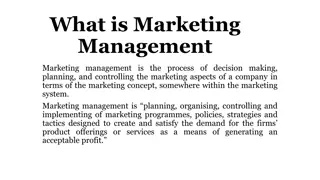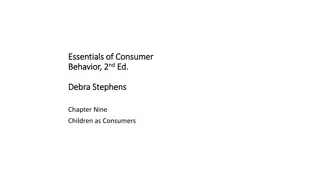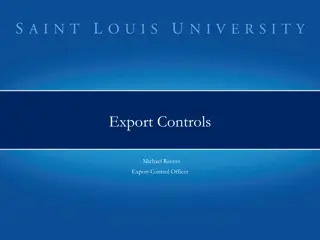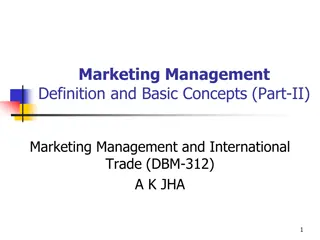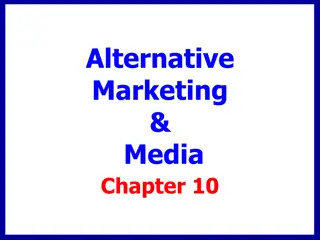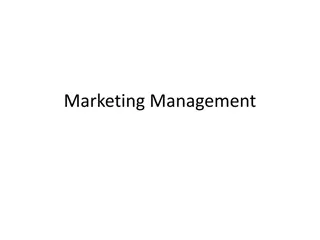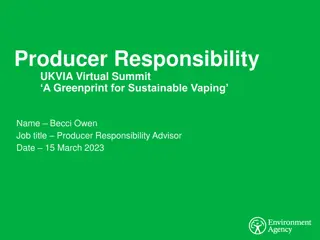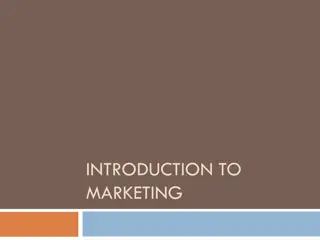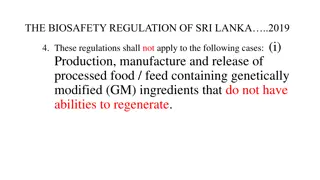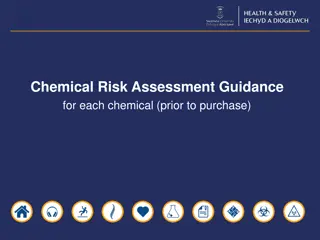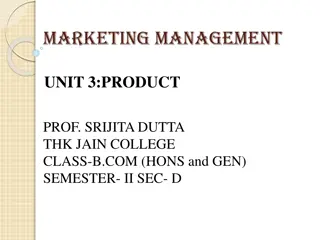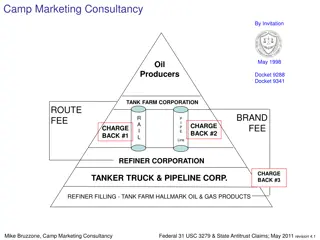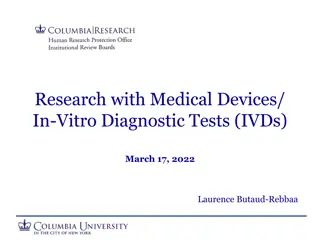Importance of Breastfeeding and Marketing Regulations
Breastfeeding provides numerous benefits for both infants and mothers, including optimal nutrition, reduced risk of infections, and lower chances of developing diseases like breast and ovarian cancer. The International Code of Marketing of Breast-milk Substitutes aims to regulate the promotion of alternatives to breastfeeding to protect infant health. By promoting breastfeeding, we can enhance child survival rates, prevent diseases, and establish a strong bond between mother and child.
Download Presentation

Please find below an Image/Link to download the presentation.
The content on the website is provided AS IS for your information and personal use only. It may not be sold, licensed, or shared on other websites without obtaining consent from the author. Download presentation by click this link. If you encounter any issues during the download, it is possible that the publisher has removed the file from their server.
E N D
Presentation Transcript
Breast feeding Breast milk Breast milk substitutes Breast milk supplies ideal mix, density, and physiologic form of nutrients to promote adequate infant growth and development Reduces exposure of infant to enteropathogens Antibacterial and antiviral Reduces infant infections Provides biologic and emotional bond between mother and infant Healthy for mother reduces risk of ovarian and breast cancer, post- partum hemorrhage and anemia; increases birth spacing Low cost
WHY IS BREASTFEEDING IMPORTANT? Breast milk is safe, clean and contains antibodies which help protect the infant against many common childhood illnesses. The protection, promotion and support of breastfeeding rank among the most effective interventions to improve child survival. Increasing breastfeeding to near-universal levels could save more than 820 000 lives every year. In addition, increased rates of breastfeeding could prevent nearly half of all diarrheal diseases and one-third of all respiratory infections in children in low- and middle-income countries. Children who were breastfed are less likely to become overweight or obese and less prone to develop diabetes later in life.
Mothers who breastfeed also reduce their risk of developing breast and ovarian cancers. At current breastfeeding rates, an estimated 20 000 deaths from breast cancer are prevented. In addition, breastfeeding delays early return of fertility in the mother, and reduces her risk of postpartum haemorrhage. Breast-milk substitutes and feeding bottles in particular carry a high risk of contamination that can lead to life-threatening infections in young infants. Infant formula is not a sterile product and it may carry germs that can cause fatal illnesses. Artificial feeding is expensive, requires clean water, the ability of the mother or caregiver to read and comply with mixing instructions and a minimum standard of overall household hygiene - factors not readily met in many households in the world.
Breast Milk Substitutes Possible breast-milk substitutes include: commercial infant formula, liquid animal milk (cow or goat), powdered animal milk, evaporated milk.
WHAT IS THE INTERNATIONAL CODE OF MARKETING OF BREAST-MILK SUBSTITUTES? The Code is a set of recommendations to regulate the marketing of breast-milk substitutes, feeding bottles and teats. The Code aims to stop the aggressive and inappropriate marketing of breast-milk substitutes. The 34th session of the World Health Assembly (WHA) adopted the International Code of Marketing of Breast-milk Substitutes in 1981 as a minimum requirement to protect and promote appropriate infant and young child feeding. The Code aims to contribute "to the provision of safe and adequate nutrition for infants, by the protection and promotion of breastfeeding, and by ensuring the proper use of breast-milk substitutes, when these are necessary, on the basis of adequate information and through appropriate marketing and distribution The Code advocates that babies be breastfed. If babies are not breastfed, for whatever reason, the Code also advocates that they be fed safely on the best available nutritional alternative. Breast-milk substitutes should be available when needed, but not be promoted.
WHY IS THE CODE IMPORTANT? The Code is an important part of creating an overall environment that enables mothers to make the best possible feeding choice, based on impartial information and free of commercial influences, and to be fully supported in doing so. Inappropriate marketing of food products that compete with breastfeeding is an important factor that often negatively affects the choice of a mother to breastfeed her infant optimally. Given the special vulnerability of infants and the risks involved in inappropriate feeding practices, usual marketing practices are therefore unsuitable for these products.
WHAT ASPECTS DOES THE CODE COVER? The Code sets out detailed provisions with regard to: 1. Information and education on infant feeding; 2. Promotion of breast-milk substitutes and related products to the general public and mothers; 3. Promotion of breast-milk substitutes and related products to health workers and in health care settings; 4. Labelling and quality of breast-milk substitutes and related products; and 5. Implementation and monitoring of the Code.
WHAT PRODUCTS ARE COVERED BY THE CODE? The Code applies to the marketing and related practices of the following products: breast-milk substitutes, including infant formula. This should be understood to include any milks (or products that could be used to replace milk) that are specifically marketed for feeding infants and young children up to the age of 3 years, including follow-up formula and growing-up milks other foods and beverages promoted to be suitable for feeding a baby during the first six months of life when exclusive breastfeeding is recommended. This would include baby teas, juices and waters, etc feeding bottles and teats.
WHAT ARE THE CURRENT WHO RECOMMENDATIONS FOR FEEDING INFANTS AND YOUNG CHILDREN? To achieve optimal growth, development and health, WHO recommends that infants should initiate breastfeeding within one hour of birth and be exclusively breastfed for the first six months of life. Thereafter, to meet their nutritional requirements, infants should receive adequate and safe complementary foods while breastfeeding continues up to two years of age and beyond.
WHAT DOES THE CODE SAY ABOUT INFORMATION AND EDUCATION ON INFANT FEEDING? The Code and subsequent relevant WHA resolutions call upon governments to ensure that objective and consistent information is provided on infant and young child feeding, both to families and others involved in infant and young child nutrition. Informational and educational materials should clearly state the benefits and superiority of breastfeeding, the social as well as financial costs of using infant formula, the health hazards associated with artificial feeding and instructions for the proper use of infant formula.
Provisions of the code PROMOTION OF BREAST-MILK SUBSTITUTES TO THE GENERAL PUBLIC AND MOTHERS The Code explicitly states that there should be no advertising or other form of promotion to the general public. This would include any advertising through mass media outlets such as television, magazine, billboards, websites, or social media. In addition, manufacturers and distributors of breast milk substitutes should not provide samples of their products to pregnant women, mothers or members of their families. Promotion through other means, such as special displays, discount coupons, price reductions, or special sales, is also prohibited. Furthermore, no company personnel should seek direct or indirect contact with, or provide advice to, pregnant women or mothers, whether this is in retail outlets or through social media channels.
Mothers: Information and educational materials on infant and young child feeding should be objective and consistent and emphasize the importance of breastfeeding. In no case should such materials refer to a brand name of a product. All forms of product advertising and promotion are prohibited. Mothers should not be given free product samples. Promotional devices such as discounts and special displays at the retail level are prohibited. Company representatives may not initiate direct or indirect contact with mothers. Health risks to infants who are artificially fed or who are not exclusively breastfed should be highlighted through appropriate labeling and warnings.
PROMOTIONAL ACTIVITIES TO HEALTH WORKERS AND IN HEALTH CARE SETTINGS? The Code and subsequent relevant WHA resolutions call for a total prohibition of any type of promotion of breast-milk substitutes, bottles, etc in health services. Furthermore, donations of free or subsidized supplies of breast-milk substitutes or other products, as well as gifts or personal samples to health workers, are not allowed in any part of the health care system. WHA Resolution 39.28 clearly stated that infant formula needed for infants with medical reasons for its use should be obtained through normal procurement channels. Information provided by manufacturers and distributors to health professionals regarding products should be restricted to scientific and factual matters.
Health care systems Promotion of any product is forbidden in a health care facility. This includes the display of products, placards and posters concerning such products and distribution of materials provided by manufacturers and distributors. Formula feeding should be demonstrated only to those mothers or family members who need to use it and the information given should include a clear explanation of the risks of formula feeding and hazards of improper use of products. Donated equipment and materials should not refer to brand names of products. Free Supplies: Two subsequent resolutions (WHA 39.28 [1986] and WHA 47.5 [1994]) effectively call for an end to all free or low-cost supplies to any part of the health care system. Manufacturers and distributors are therefore prohibited from providing products to health care facilities for free or at low cost. (According to guidelines under the Baby Friendly Hospital Initiative, low cost means less than 80% of the retail price.)
LABELLING AND QUALITY OF BREAST-MILK SUBSTITUTES No pictures of infants or other pictures idealizing the use of breastmilk substitutes are permitted on the labels of the products. Information on artificial feeding, including that on labels, should explain the benefits of breastfeeding and the costs and dangers associated with the unnecessary or improper use of infant formula and other breast-milk substitutes. Unsuitable products for feeding infants, such as sweetened condensed milk, should not be promoted.
Labelling Information on labels for infant formula must be in simple and easy to understand terms in an appropriate language. Labels of infant formula must contain a statement on the superiority of breastfeeding and that the product should only be used after consultation with health professionals. Pictures or text which may idealize the use of infant formula and certain wordings, such as 'humanized or materialized or similar terms should not be used. Nutrition and health claims on labels for breastmilk substitutes should not be permitted unless allowed by national legislation (WHA resolution 58.32 [2005]). Labels must contain explicit warnings to inform consumers about the risks of contamination of powdered formula with pathogenic microorganisms Labels must conform with WHO/FAO guidelines on safe preparation, storage and handling of powdered infant formula .
WHO IS RESPONSIBLE FOR MONITORING THE IMPLEMENTATION OF THE INTERNATIONAL CODE? Primary responsibility for monitoring of the Code lies with governments. Monitoring is more effective when responsibility is shared among key government agencies that have a role during the different phases of marketing and of relevant products. National Code legislation should indicate which government agency or agencies should lead the monitoring, and how monitoring should be conducted. Manufacturers and distributors of breast-milk substitutes should monitor their marketing practices at all levels. Similarly, health professionals and health managers have a responsibility for monitoring their practices in health care settings, ensuring that no marketing takes place in facilities. Non-governmental organizations, institutions and individuals can draw the attention of manufacturers and distributors to activities which are incompatible with the Code, and inform the government so that action can be taken.
